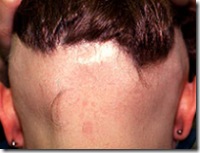Alopecia Areata
 Alopecia areata is a rare autoimmune disease that affects about 1 per cent of the population in the United States. Alopecia areata can come in various forms, for example, as an oval or round patch of a bald area on the scalp (alopecia monolocularis), or as multiple patches of non-scarring alopecia, which are usually asymptomatic (alopecia multilocularis).
Alopecia areata is a rare autoimmune disease that affects about 1 per cent of the population in the United States. Alopecia areata can come in various forms, for example, as an oval or round patch of a bald area on the scalp (alopecia monolocularis), or as multiple patches of non-scarring alopecia, which are usually asymptomatic (alopecia multilocularis).
About twenty percent of all cases manifest as alopecia totalis, when baldness affects the entire scalp area, and it extremely rare cases alopecia areata can even effect all hairs on the body, including eyelashes (alopecia universalis). Usually, milder forms of the disease do not last long and, in 50 percent of cases, hair spontaneously resolves in about a year, but alopecia can also suddenly return back without a particular cause or pattern. Severe forms of the disease, especially in atopic patients and children, require medical attention. Hair loss in alopecia areata is often accompanied by changes in fingernails - they can become brittle, discolour, or show other dystrophic changes, such as ridging or pitting.
Medical treatment for alopecia areata depends on the severity of the disease, as well as on overall health and the age of the patient. It has to be noted that there is no proven cure to the condition. If bald patches are small, your dermatologist can recommend intralesional corticosteroid in the form of triamcinolone acetonide, also known as kenalog®. The medication has to be injected directly into the entire area of the patch about once a month. You can also try such drugs of choice as steroids, anthralin, or topical minoxidil. If the disease affects large areas of the scalp, the more efficient medication diphencyprone (a contact allergen) can be used. Clinical studies show that diphencyprone is very effective in almost fifty percent of alopecia areata cases. There are also other types of treatment available in cases of severe alopecia areata, such as systemic steroids, UV radiation, and psoralens. However, if you agree to use steroids, you have to be very careful and monitor your health often, as steroid medication might have profound side effects and therefore should not be used for a prolonged period of time. Another negative side of using systemic steroids is that hair usually falls off again after discontinuation of the medication.
If patients suffer from social discomfort due to hair loss (especially women), wigs could be recommended. Naturopathic doctors suggest that patients with alopecia areata should use natural anti-inflammatory supplements, such as zinc tablets and borage and blackcurrant oils.
 Alopecia areata strikes when the body’s immune system makes a mistake, treating its own hair follicles as foreign and therefore suppressing or stopping hair growth. The disease is not contagious but, as many other autoimmune disorders, it can be hereditary. In addition, a lot of cases of alopecia areata can be triggered by stress and emotional tension. It is known that patients with this hair loss disease are also more prone to developing conditions like systemic lupus, allergies, atopic dermatitis, hyposterodism, and asthma.
Alopecia areata strikes when the body’s immune system makes a mistake, treating its own hair follicles as foreign and therefore suppressing or stopping hair growth. The disease is not contagious but, as many other autoimmune disorders, it can be hereditary. In addition, a lot of cases of alopecia areata can be triggered by stress and emotional tension. It is known that patients with this hair loss disease are also more prone to developing conditions like systemic lupus, allergies, atopic dermatitis, hyposterodism, and asthma.
Robin Makris
Posted on September 14, 2007
Filed Under Hair Loss Conditions
Comments
Leave a Reply